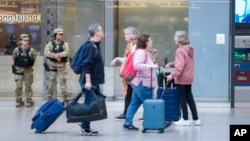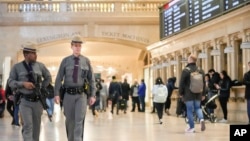In some U.S. cities, fears of crime on subways and buses are again at the forefront of people’s minds, as are efforts to persuade public officials to take the issue seriously.
New York’s governor said Wednesday she will assign 750 National Guard members to help patrol the nation’s busiest subway system, saying she believes New York City police are needed after a shooting on a train platform in which a conductor was slashed in the neck. reinforce.
In Pennsylvania, lawmakers created a special prosecutor to pursue crimes committed on transportation systems in the southeastern part of the state. Philadelphia Mayor Cherelle Parker on Thursday pledged to increase police patrols and use “all legal and constitutional tools” following a series of traffic-related shootings that left three people dead and 12 injured, many of them schoolchildren.
“Enough is enough,” she said on WURD radio.
It remains to be seen whether these initiatives will have any impact on reducing crime on these large public transit systems.
At least in New York, Gov. Kathy Hochul acknowledged that calling in the National Guard was as much about calming fears and making a political statement as it was about making public transportation safer. The Democrat said the city’s subways are already fairly safe. Felony crime did not increase significantly. But she believes a show of force may do more to quell anxiety than any statistic.
“If you feel better walking past a uniformed person on the subway to make sure someone doesn’t have a knife or a gun, then that’s exactly why I do it. I want to change the psychology of crime in New York City,” Hochul said Thursday said on MSNBC. “It’s safe. But I want to make sure people feel safe.”
“I will also prove that Democrats are also on crime,” she added. “So the Republican narrative that we’re soft on crime, that we defund the police — no.”
Major crime on the New York City transit system dropped nearly 3% from 2022 to 2023, with five homicides last year, down from 10 the year before, according to police. Overall, violent crime is rare on the subway system, and train cars and stations are generally as safe as other public spaces.
In Pennsylvania, total crime on the transit system has declined in recent years, although the Southeastern Pennsylvania Transportation Authority (SEPTA) reported six homicides in 2023, up from a total of seven over the past three years.
Still, the issue of safety on buses and trains has been resonating with voters, especially as some systems recover from the COVID-19 pandemic and riders leave.
“Yeah, it’s been a little bit unsafe lately. So I think they should get it under control before it gets out of hand,” said Alan Uloa, 43, a New York City resident. “Just people, people take things seriously The way they reacted…people were just fighting over seats. They slashed the conductor the other day, which wasn’t cool.”
In New York, Republicans blasted Democrats over crime during the 2022 midterm elections, a message that helped the party win suburban congressional seats.
Alex Piccolo, a criminology professor at the University of Miami and former director of the federal Bureau of Justice Statistics, said increased enforcement could be a double-edged sword.
“For some people, they want to see more security. Just because there’s an officer there, they feel safer,” he said. “And for other people, they’re going to say we’re overreacting.”
Vincent del Castillo, a professor at John Jay College of Criminal Justice and former chief of the New York City Transit Police Department, said political tough talk masks the reality that traffic crimes make up only a small portion of all crime.
“When there are hundreds of murders across the city, there might be 10 or 12 murders in the system, but because it’s so rare it raises a lot of concerns,” he said.
Four shootings on or related to Philadelphia’s public transportation began Sunday when a man was shot and killed by another passenger shortly after getting off the bus. The next day, a shooting occurred at a bus stop, killing a teenager and wounding four others. A man was killed Tuesday when a person who got out of his vehicle opened fire into a vehicle, police said.
On Wednesday, eight teenagers waiting to take a city bus home after school were shot in an attack that left the bus riddled with bullet holes.
SEPTA Police Chief Charles Lawson promised transit officials would take an aggressive approach and use “every criminal law in the book” to combat illegal gun possession on the transit system.
“We’re going to target individuals who hide their identities. We’re going to target fare evasion. We’re going to target open drug use,” he said this week.
New York City’s National Guard will not be as active. Their mission is to help police conduct random searches of people’s bags as they enter the subway system, a practice that has been in place for nearly two decades.
Passengers have the right to refuse a search, but if they do, they will be asked to leave the subway system.
The National Guard cannot arrest anyone, but if they witness a crime, they can detain someone until police arrive, just like any civilian can do.
Although Guard troops were deployed Thursday, transit riders in New York City may not have noticed. There are not many sightings of the troops at stations or on trains, but there are patrols at major hubs such as Grand Central and Penn Station, where they have been a regular presence since the Sept. 11, 2001, terrorist attacks.
Passengers have long been divided over the issue of police bag checks, which are uncommon but can hinder passengers as they scramble to catch their trains. They have also long been the subject of racial profiling, although the NYPD says it has taken steps to avoid it.
“Sometimes when I’m in a hurry and I have a bag in my hand, I don’t like to be stopped,” said actor and musician Jerome Brooks Jr., 44. “So I try to look, If they’re going to block other people who don’t look like me, are they going to block me? But overall, I hope they do the right thing.”
Cheryl Ann Harper, 46, said she welcomed the precaution.
“Yes, it’s random and we need it,” she said, noting that similar checks are common in theaters. “I do it all the time. Okay? No big deal. You know, if you have nothing to hide, why can’t you just open your bag?”
Follow us on Google news ,Twitter , and Join Whatsapp Group of thelocalreport.in















